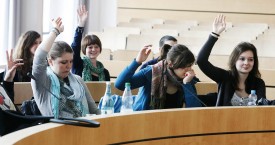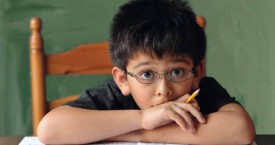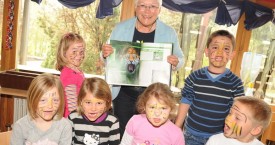Die allgemeinen Bildungsziele bleiben zwar die gleichen: selbstbestimmtes Leben, berufliches Wirken, gesellschaftliche Teilhabe ermöglichen. Dafür ist unabdingbar, die gesellschaftlichen, technischen, ökologischen und beruflichen Veränderungsprozesse zu verstehen und möglichst mitgestalten zu können.
Die globalen Megatrends stellen die Art des Lernens und die Bildungssysteme vor vielfältige Herausforderungen:
- Die Globalisierung verstärkt den Wettbewerb nicht nur um Produkte und Dienstleistungen, sondern auch Um die besten Köpfe.
- Die Digitalisierung macht das globale wissen verfügbar auf jedem Smartphone und öffnet neue Wege und Notwendigkeiten des analogen und digitalen Lernens.
- Die Urbanisierung erfordert in den wachsenden Städten differenzierte Angebote für lebenslanges Lernen beginnend in den Kitas.
- Soziale Heterogenität und kulturelle Diversität in den internationalen Stadtgesellschaften erfordern neue Formen des individuellen Lernens und des Arbeitens in Teams.
- Der demographische Wandel mit einer älter werdenden Bevölkerung erfordert neue Formen der beruflichen Qualifikation und Fortbildung sowie des lebenslangen Lernens.
- Der Klimawandel ist das spürbare Zeichen für die ökologische Überforderung unserer natürlichen Ressourcen.
Bildung für nachhaltige Entwicklung und damit verbundenen Veränderungen unserer Lebens- und Arbeitsgewohnheiten sind eine weitere Herausforderung für unser Bildungssystem.
Die UN Agenda 2030 formuliert als Ziel Nummer 4: inklusive, gerechte und hochwertige Bildung gewährleisten und Möglichkeiten des lebenslangen Lernens für alle fördern. Diesen Bildungsauftrag hat die Stadt Stuttgart im Rahmen der kommunalen Zuständigkeiten mit den Schwerpunkten auf frühkindliche Bildung, schulische und außerschulische Bildung sowie informelle lebenslange Bildung systematisch wahrgenommen. Im Sinne einer Bildungskette beginnt die Stuttgarter Bildungspartnerschaft deshalb mit den Kindern. Dies ist in einer Stadt wie Stuttgart besonders wichtig, da fast 60% der Kinder einen Migrationshintergrund haben.
„Um ein Kind zu erziehen, braucht es ein ganzes Dorf“. Dieses afrikanische Sprichwort gilt umso mehr in komplexen, sich dynamisch veränderten Stadtgesellschaften. Deshalb hat die Landeshauptstadt ein ganzheitliches, miteinander vernetztes und aufeinander abgestimmtes Betreuungs-, Erziehungs- und Bildungskonzept entwickelt: Die Stuttgarter Bildungspartnerschaft.
Die zehn Ziele der Stuttgarter Bildungspartnerschaft
„In Stuttgart soll jedem Kind und jedem Jugendlichen eine Förderung und Bildung zu teil werden, die ihm faire Zukunftschancen eröffnen“. Es gilt, dass aus dem Grundsatz gelebte Realität wird: Ausgehend von den bildungspolitischen Prämissen soll dieser Grundsatz durch zehn Ziele konkretisiert und erreicht werden. Diese zehn Ziele, die miteinander verbunden sind und teilweise aufeinander aufbauen, stellen sehr bewusst jedes Kind und jeden Jugendlichen in den Mittelpunkt unserer Bildungsanstrengungen.
1. Jedes Kind soll spätestens mit dem dritten Lebensjahr eine Kindertagesstätte besuchen und dabei in seiner sozialen, körperlichen und sprachlichen Entwicklung individuell gefördert werden sowie ausreichende deutsche Sprachkenntnisse bis zum Schulbeginn erwerben.
2. Jedes Kind soll beim Übergang vom Kindergarten zur Grundschule dank einer engen Zusammenarbeit der Erzieherinnen mit den Lehrerinnen/Lehrern individuell begleitet werden.
3. Jedes Kind und jeder Jugendliche soll sich entsprechend seinen Begabungen musisch-kulturell bilden und entfalten können.
4. Jedes Kind und jeder Jugendliche soll vielfältige Möglichkeiten für Bewegung und Sport erhalten.
5. Jedes Kind und jeder Jugendliche soll seine Muttersprache vertieft erlernen können im Interesse seiner persönlichen Entwicklung und seiner beruflichen Chancen in unserer Exportwirtschaft.
6. Jedes Kind und jeder Jugendliche soll sich – soweit möglich – bei der Gestaltung seines Umfeldes einbringen können.
7. Jedes Kind und jeder Jugendliche soll in unserem mehrgliedrigen Schulsystem so gefördert werden, dass es/er jeweils Anschluss an eine weiterführende Schule oder eine berufliche Ausbildung erhält.
8. Jeder Jugendliche in Stuttgart soll eine faire Chance auf eine berufliche Ausbildung erhalten.
9. Jedes Kind und jeder Jugendliche, auch die benachteiligten, sollen faire Chancen durch ein intensives Netzwerk der Förderung in unserer Stadtgesellschaft erhalten.
10. Jedes Kind und jeder Jugendliche soll durch seine Eltern dank einer intensiven Elternbildung qualifiziert unterstützt werden können.
Diese bildungspolitischen Ziele zu erreichen ist zugleich eine wesentliche Aufgabe für eine kinderfreundliche Stadt. Deshalb ist ein Schwerpunkt des Arbeitsprogramms Kinderfreundliches Stuttgart die Stuttgarter Bildungspartnerschaft mit den oben genannten zehn Zielen. Da Bildung zugleich ein wesentlicher Schlüssel für die Integration ist, sind die Ziele der Stuttgarter Bildungspartnerschaft zugleich eine tragende Säule unseres integrationspolitischen Programms „Bündnis für Integration“. Neben dem nationenübergreifenden Lernen gilt es, das Miteinander und voneinander Lernen der Generationen zu fördern. Dazu trägt der Stuttgarter Generationenvertrag bei. Nicht zuletzt ist unsere Bildungsoffensive ein wesentlicher Beitrag zu unserem Präventionsprogramm Stuttgarter Sicherheitspartnerschaft, einer Gemeinschaftsinitiative von Bürgerschaft, Rathaus und Polizei.
Perspektive: Lebenslange Bildung für alle
„Wir müssen die ,Bildungsrepublik Deutschland’ werden. Wohlstand für alle heißt heute und morgen: Bildung für alle.“ (Bundeskanzlerin Dr. Angela Merkel)
Der Zukunftsfaktor Bildung ist für ein ressourcenarmes Land wie Deutschland unverzichtbare Voraussetzung für qualitatives Wachstum und allgemeinen Wohlstand, für Chancengerechtigkeit und soziale Sicherung. Investitionen in diesen Bereich zahlen sich dreifach aus: Sie machen die Menschen, die Gesellschaft und die Wirtschaft zukunftsfähig. Dabei werden sich die Bildungsziele erweitern. Wir brauchen zum einen normierte Qualifikationen in der Schule und im Beruf – und dies häufig mit steigenden Anforderungen. Wir brauchen aber auch Bildungsangebote für informelle Bildung, die als lebensbegleitende Bildung über das Berufsleben hinaus die Menschen befähigt, eigenverantwortlich und selbstständig ihr Leben zu gestalten. Dies ist von besonderer Bedeutung im Hinblick auf die wirtschaftlichen, technischen, sozialen und demografischen Veränderungsprozesse im 21. Jahrhundert und auf das Leben nach beziehungsweise außerhalb der Erwerbstätigkeit. Die Stuttgarter Bildungspartnerschaft hat sich als erste Priorität die Zukunftsperspektiven für Kinder und Jugendliche gesetzt. Die damit verbundenen Hausaufgaben sind noch nicht gemacht. In einem weiteren Schritt wird das Konzept Stuttgarter Bildungspartnerschaft fortgeschrieben: lebenslanges Lernen für ein langes Leben. Das Verhältnis von Lebenszeit und Lernzeit wird sich neu bestimmen. Wer nicht weiterlernt, kommt auch im Leben nicht weiter. Dies betrifft nicht nur die berufliche Weiterentwicklung, sondern künftig ist mehr denn je das lebensbegleitende Lernen bis ins hohe Alter hinein notwendig. Dazu bedarf es informeller Bildungsangebote, die sich durch Erfahrungslernen auf freiwilliger Basis auszeichnen. Für die Annahme und Intensität des Bildungsengagements ist zwar jeder selbst verantwortlich. Es liegt aber in unserer aller Interesse, dass angesichts der wachsenden Lebenserwartung die Menschen möglichst lange selbstbestimmt und eigenverantwortlich leben und sich in unserer, sich komplex wandelnden Welt zurechtfinden können.
Ob Elternbildung, frühkindliche Bildung, schulische und außerschulische Bildung, Hochbegabten-Bildung und Lernschwachen-Bildung, berufliche Bildung und betriebliche Weiterbildung, Erwachsenen-Bildung und Senioren-Bildung, handwerkliche und akademische Bildung, formelle Bildung und informelle Bildung: Bildung als lebensbegleitender Prozess bedarf vieler Partner, ganz besonders das Land Baden-Württemberg. Die Stuttgarter Bildungspartnerschaft versteht sich deshalb auch als partnerschaftlicher, lernender Prozess, damit lebenslange Bildung für alle möglich wird.
The general educational goals did not change: enabling people to have a self-determined life, professional chances, and societal engagement and participation. For this end, however, it is indispensable to understand and to shape the ongoing technical, ecological and professional change processes.
The global mega-trends present the way of learning and the educational systems with manifold challenges:
- Globalization enhances the competition not only for products and services but for the brightest minds.
- Digitalization provides access to the global knowledge on every smartphone and opens new ways but also creates new requirements for both analogue and digital learning.
- Urbanization necessitates in the growing cities differentiated educational services for life-long learning, starting in the Kindergartens.
- Social heterogeneity and cultural diversity in international urban societies makes new forms of individual learning and team work necessary.
- The demographic change with an ageing population requires new forms of professional qualifications and training, as well as of life-long learning.
- Climate change is a noticeable sign of the ecological depletion of our natural resources.
Education for sustainable development and the corresponding change of our lifestyles and work habits is a further challenge for our education system.
The UN Agenda 2030 formulated as Sustainable Development Goal No. 4 the provide inclusive, fair and high-quality education, and opportunities for life-long learning for everyone.
The city of Stuttgart addressed these educational goals systematically within its municipal educational responsibilities with a focus on early childhood development, formal and non-formal education, and also on informal life-long learning. To create an educational chain, the educational partnership starts in Stuttgart with the children. This is particularly important in a city, where almost 60% of children have a migration background.
„It takes a whole village to educate a child“.
This African saying applies the more so in complex, dynamically changing urban societies. That is why the City of Stuttgart has developed an integrative, networked and coordinated concept for care and education: the Stuttgart Partnership for Education.
The ten targets of the Stuttgart Partnership for Education
„In Stuttgart all children and adolescents should be given the support and education that will provide them with fair future prospects“. It is essential that this principle becomes reality: starting out from the educational-political premises this principle should be substantiated and achieved by ten targets. These ten targets, interconnected and often built upon one another, have deliberately each and every child and adolescent at the focus of our educational efforts.
1. Every child should by the age of three attend a day care centre and be individually assisted in his or her social, physical and linguistic development and acquire sufficient proficiency in German before he or she starts school.
2. Every child should be individually supervised in the transition from kindergarten to primary school thanks to a close cooperation between the pre-school teachers and school teachers.
3. Every child and adolescent should have the possibility of developing his or her artistic or musical talents.
4. Every child and adolescent should be provided with a variety of opportunities for sports and physical activities.
5. Every child and adolescent should be able to learn his or her native language in the interest of his or her own personal development and his or her vocational chances in our export economy.
6. Every child and adolescent should – as far as possible –be able to play a part in shaping his or her environment.
7. Every child and adolescent should be supported in our multi-stream school system in such a way that he or she receives a good connection to secondary schools or vocational training.
8. Every adolescent in Stuttgart should have a fair chance of vocational training.
9. Every child and adolescent, also those who are disadvantaged, should have fair chances through an intensive network and advancement in our urban community.
10. Every child and adolescent should have the qualified support of his or her parents thanks to intensive parent education.
Achieving these educational-political targets is at the same time a fundamental task for a child-friendly city. Therefore, one focal point of the programme of „Stuttgart – City for Children“ is the Stuttgart Partnership for Education with the above mentioned ten targets. Since education is a key factor for integration, the objectives of the Stuttgart Partnership for Education form the backbone of the integration-political programme „Pact for Integration“. Over and above cross-nation learning, it is essential to encourage and support a feeling of togetherness among the generations and learning from one another. The Stuttgart Generation Pact plays an important role here. Ultimately our educational campaign is also a fundamental contribution to our preventative programme, the Stuttgart Partnership for Safety and Security, a joint initiative of civic groups, the City Council and the police.
Perspective:
Lifelong learning and education for all
„We have to become a ‚Bildungsrepublik Deutschland‘ – Germany – an Educational Republic. Prosperity for all means – now and in the future – education for all.“ (Federal Chancellor, Dr. Angela Merkel)
For a country like Germany that has few natural resources, the future factor education is an essential prerequisite for qualitative growth and common prosperity, for equal opportunities and social security. The investments made in this field are paid back threefold: they make the people, the society and the economy sustainable by extending educational objectives. On the one hand we require standardised qualifications in school and in vocational training – and that often with increasing demands and requirements. On the other hand, we also need informal education – learning for life, something that goes beyond jobs and profession, something that enables people to shape their own lives responsibly and independently. This is particularly important in the light of the economic, technical, social and demographical change processes taking place in the 21st century and with a view to life after or outside gainful employment. The top priority of the Stuttgart Partnership for Education is the future perspectives of children and adolescents. However, there is still a lot of homework to be done in this field. The concept of the Stuttgart Partnership for Education will be continued in a further stage: lifelong learning for a long and fulfilled life. There is a growing need for a redefinition of the relation between lifetime and learning time. If you don’t get on with learning, you won’t get on in life. This does not just apply for advancement in working life, in future lifelong learning will be more important than ever before. This calls for informal educational opportunities, learning by experience on a voluntary basis. Of course everyone is individually responsible for the acceptance and the extent of this commitment to learning, but it is in the interest of us all that, in view of our longer life expectancy, we can all live as autonomously and self-reliantly as possible and manage our situation in this complex and changing world of ours.
Education: Whether it’s parent education, early childhood education, school or extra-curricular education, education for the gifted or for those with learning difficulties, vocational training and further education, adult education, education for seniors, education in trades and academia, formal and informal education – many partners are required for this lifelong educational process, in particular the State of Baden-Wuerttemberg. The concept behind the Stuttgart Partnership for Education is therefore one of a cooperative and learning process.
Discussion
-
Stuttgart ist die nachhaltigste Stadt Deutschlands « i-nse.org März 29, 2013



